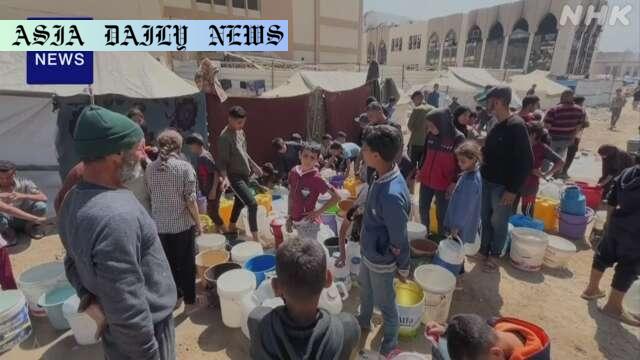Humanitarian Aid: Despite 93 UN trucks entering Gaza, aid delivery to residents is delayed, worsening the ongoing humanitarian crisis.
- 93 UN aid trucks entered Gaza for the first time in months.
- Aid delivery is delayed as permissions to distribute are pending.
- A severe crisis persists with malnutrition and supply shortages.
- Gaza requires 500 aid trucks daily to address immediate needs.

93 UN Aid Trucks Enter Gaza After Months of Blockade
The humanitarian situation in Gaza has reached a critical point. For the first time in two and a half months, the United Nations succeeded in sending 93 trucks laden with essential humanitarian supplies into the beleaguered region. Israel’s military gave the clearance for these trucks to pass through; however, the aid has yet to reach the people who need it the most. Bureaucratic hurdles in obtaining internal permissions for distribution continue to delay operations, aggravating the crisis in the war-torn region.
The Deepening Humanitarian Crisis
Gaza faces a catastrophic humanitarian challenge with acute shortages of food, medical supplies, and essential resources like clean water. Reports indicate a grim reality—since March, malnutrition has claimed 58 lives, and 300 pregnant women have experienced miscarriages due to nutritional deficiencies. Local authorities warn that the current scale of aid is far from sufficient. They estimate that at least 500 truckloads of aid per day are required to merely stabilize the situation and prevent further loss of life.
Continued Hostilities Hamper Relief Efforts
Compounding the aid crisis is the lack of safety in Gaza. On Wednesday, Israeli airstrikes in both northern and southern parts of the territory reportedly killed over 20 civilians, according to Palestinian media. This highlights the vulnerability of the population amid ongoing military aggression. Meanwhile, hopes for a ceasefire remain dim as substantial differences persist between Israel and Hamas in negotiations. The deadlock in addressing the root causes of the conflict places additional pressure on humanitarian efforts and international diplomacy.
Urgent Need for Global Intervention
Amid the deepening crisis, the international community is being urged to act decisively. A comprehensive and coordinated approach is essential to channel adequate aid into Gaza, ensure its equitable distribution, and address the immediate needs of the population. Moreover, resolving the root causes of the conflict is imperative to prevent recurring cycles of suffering and instability in the region. The dire situation in Gaza is a poignant reminder of how protracted conflicts disproportionately affect vulnerable populations, requiring lasting solutions rather than temporary fixes.



Commentary
The Importance of Swift and Efficient Humanitarian Response
The arrival of 93 United Nations trucks carrying relief supplies into Gaza is a welcome step but falls woefully short of addressing the sheer scale of the humanitarian crisis. Efforts like these, while commendable, highlight the complexities of providing aid in conflict zones, where logistical challenges and security risks can impede life-saving measures. This recent development underscores the urgent need for not just more aid, but for mechanisms ensuring their timely distribution to those in desperate need.
The Human Cost of Bureaucratic Delays and Prolonged Conflict
The ongoing delays in distributing aid inside Gaza are disheartening. Bureaucratic red tape in settings of extreme suffering often exacerbates human casualties, as seen with malnutrition-related deaths and miscarriages. Such delays highlight the need for more agile and robust strategies that prioritize human lives over procedural bottlenecks. Simultaneously, the relentless airstrikes compound the vulnerabilities of civilians, showing the high human cost when relief efforts and conflict mitigation fail. Children, pregnant women, and already malnourished individuals pay the heaviest price in such crises.
A Call for International Responsibility and Action
The global community has a moral obligation to intervene in crises like that unfolding in Gaza. Beyond humanitarian aid, it is imperative to push for diplomatic solutions to conflicts that create such dire conditions for millions of civilians. While aid trucks provide immediate relief, long-term stability in Gaza will only be achieved through sustained international pressure to end hostilities and address the underlying political struggles driving the crisis. The world cannot turn a blind eye to Gaza’s plight, as every moment lost means more lives at stake.